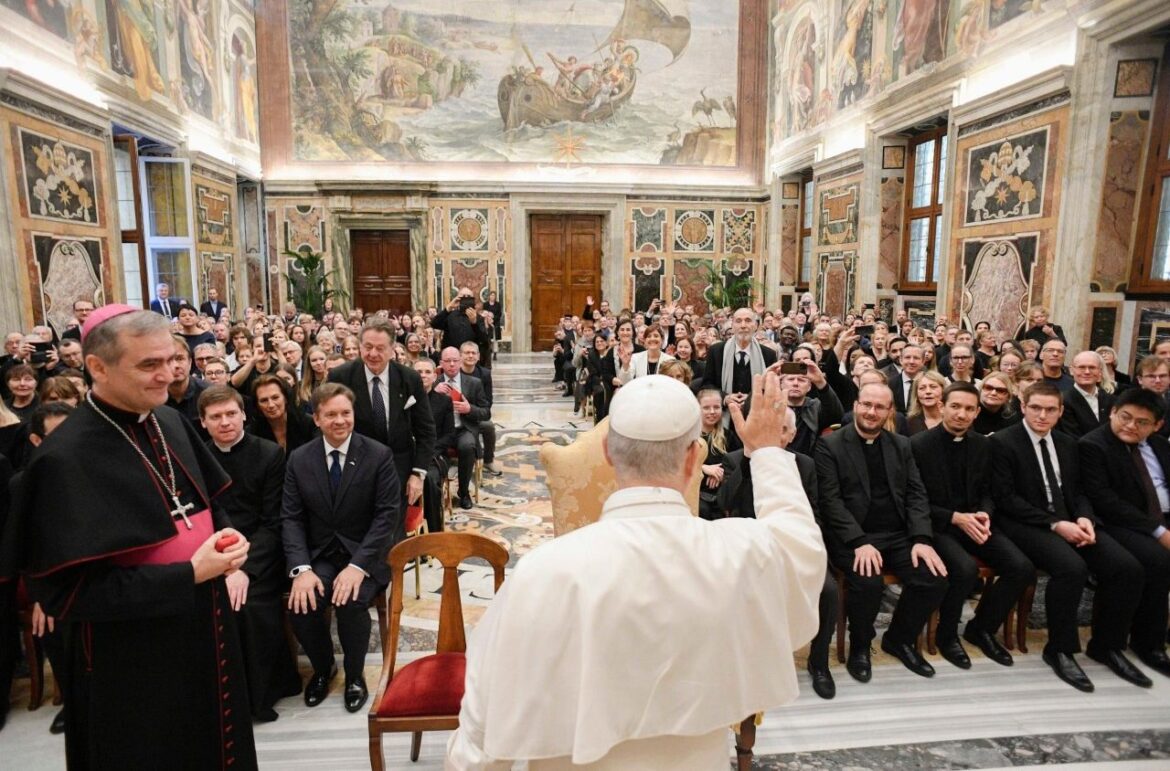
Pope Leo XIV reminds pilgrims from Estonia in Rome for the Jubilee that their ecumenical witness is the “very antithesis of the hatred that was so tragically visible during the Soviet regime’s persecution of the Church” and urges them “to pray fervently for peace” while “we still see the logic of war being perpetrated in Europe.”
By Deborah Castellano Lubov
Ecumenical witness “is the very antithesis of the hatred,” Pope Leo XIV reiterated to pilgrims from Estonia for the Jubilee on Friday in the Vatican, as he implored them to pray for peace.
The Holy Father began his remarks expressing his prayer that as they visit the various holy sites. Their hope in the Lord’s promises, he said, will be strengthened so that they can return home “full of joy,” and be ready to share their faith with they encounter “by proclaiming the Gospel in simple ways each day.”
The witness of Blessed Archbishop Eduard Profittlich
Pope Leo acknowledged the presence, within the group, of some members of the Estonian Lutheran Church, together with other non-Catholics, including a group of those who supported the organizing of the beatification of Blessed Archbishop Eduard Profittlich, SJ, (1890-1942), which took place in Tallinn on 6 September and was presided over by Cardinal Christoph Schönborn, Archbishop Emeritus of Vienna.
Blessed Archbishop Eduard Profittlich was officially beatified as a martyr, and became the first Catholic to be beatified from Estonia.
Born in Germany, Profittlich would later become Apostolic Administrator of Estonia. During the Soviet occupation, he was urged to leave but chose to remain with his flock, stating that a shepherd should share the fate of his sheep. This heroic choice led to his arrest and death in a Soviet prison in 1942.
Combatting hatred through unity
At the encounter with the pilgrims, Pope Leo praised the group’s unity and witness.
“Your ecumenical witness, which can only grow through setting out on pilgrimage together,” he said, “is a welcome reflection of Blessed Eduard’s own witness, and is the very antithesis of the hatred that was so tragically visible during the Soviet regime’s persecution of the Church.”
“Today, as you well know,” Pope Leo continued, “we still see the logic of war being perpetrated in Europe.”
Given this, he urged, “I would ask you to pray fervently for peace, especially during the remainder of your time in Rome.”
Signs of hope for priesthood and local Church
Pope Leo XIV then took a moment to greet two recently ordained priests in the group.
“Your generosity in saying “yes” to the Lord’s call to serve Him and the Church as ordained ministers of the Gospel,” Pope Leo underscored, “is indeed a sign of hope for the Christian community in your land. May your response to your vocation encourage many others to do likewise!”
The Pope also praised their Church’s evolution in the past decades, calling it a great sign of hope that last year their local Church was raised to the level of a Diocese, a century after its creation as an Apostolic Administration and almost 500 years after the disappearance of the ancient See of Tallinn.
“Your presence,” he added, “gives me the opportunity to congratulate you in person, and I encourage you to pray for one another, and especially for your Bishop, whom I warmly greet, so that your unity as a community of faith will always be nourished by the Lord and attract new believers.”
‘Tell your relatives the Pope is praying for them!’
The Pope expressed his hope that this be a time of God’s grace for the pilgrims, for strengthening the links between their Church and the Successor of Saint Peter, and emphasized how he accompanies them with his prayers.
Asking those before him to convey his warm greetings to their family members and friends, he stressed, “Tell them that the Pope is praying for them!”
Pope Leo XIV concluded by entrusting the pilgrims of Estonia to the Blessed Mother’s intercession and by imparting his Apostolic Blessing.

